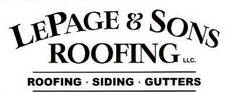Roof pitch, or the steepness of a roof, is a key factor that affects not only the aesthetic appeal of your home but also the complexity of the roofing project, materials needed, and safety requirements during installation. In this article, LePage and Sons Roofing LLC discusses the importance of roof pitch when planning your roof replacement.

Understanding Roof Pitch
Roof pitch is typically defined as the rise over the run, meaning how high the roof rises vertically for every horizontal foot it extends. This measurement is crucial because it determines the type of roofing materials that can be used, the drainage capability of the roof, and the level of maintenance it will require over time.
The Impact of Roof Pitch on Material Costs
One of the primary ways roof pitch can affect roof replacement costs is through the materials required for the project. Low-pitched roofs, or those with a slight incline, may use more cost-effective materials such as roll roofing or certain types of shingles. Conversely, high-pitched roofs require more specialized materials to ensure adequate protection and longevity. This can include premium shingles, tiles, or metal roofing, which tend to be on the higher end of the price spectrum. Meanwhile, steeper roofs often require more material to cover the same area due to the increased surface area created by the slope.
Labor and Installation Complexity
The complexity of installing a roof increases with the steepness of its pitch. For steep-pitched roofs, safety measures need to be significantly enhanced, which can lengthen the duration of the project and increase labor costs. Specialized equipment and tools may also be necessary to safely navigate the steep angles. Reputable roofing contractors are well-versed in handling these challenges professionally, ensuring that your roof is installed safely and efficiently, regardless of its pitch.
Insurance and Liability Considerations
Higher roof pitches can also influence the cost of roof replacement through insurance and liability considerations. Steeper roofs pose greater risks for roofing crews, which can affect insurance rates for roofing contractors. These increased costs may be reflected in the pricing for your roofing project. Ensuring that your roofing contractor has the appropriate insurance coverage is essential for protecting both parties during the roofing project.
Long-Term Maintenance and Durability
Generally, roofs with a steep pitch tend to shed water and snow more effectively, reducing the risk of water damage and extending the lifespan of the roofing materials. However, they may also be more susceptible to wind damage, depending on their design and construction.
For All Your Roof Replacement Needs, Look No Further!
The roof pitch plays a significant role in determining the cost of a roof replacement project. If you’re planning to replace your roof, working with a reputable and experienced roofing contractor like LePage and Sons Roofing LLC can help ensure that your project is executed smoothly, efficiently, and within your budget, no matter the pitch of your roof. Interested? Give us a call at (508) 295-6483, or fill out our online form.
